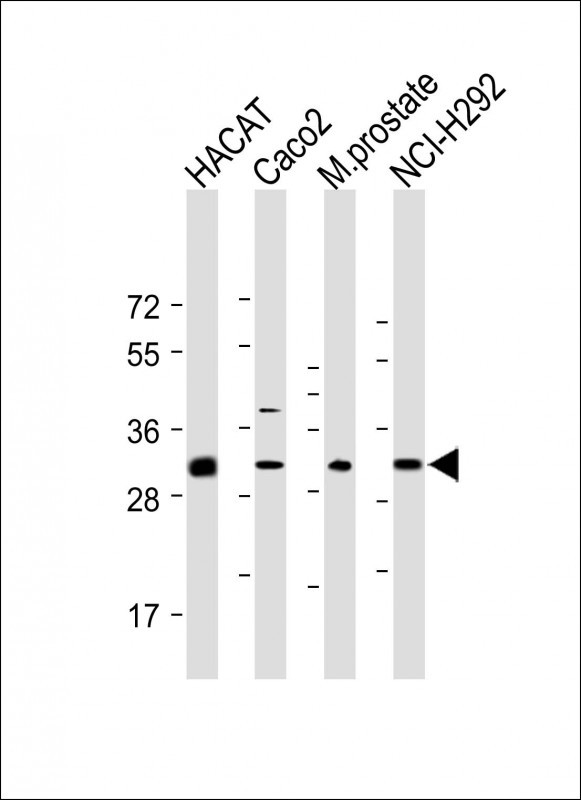
| WB | 咨询技术 | Human,Mouse,Rat |
| IF | 咨询技术 | Human,Mouse,Rat |
| IHC | 咨询技术 | Human,Mouse,Rat |
| ICC | 技术咨询 | Human,Mouse,Rat |
| FCM | 咨询技术 | Human,Mouse,Rat |
| Elisa | 咨询技术 | Human,Mouse,Rat |
| Aliases | Uroplakin-1b, UP1b, Tetraspanin-20, Tspan-20, Uroplakin Ib, UPIb, UPK1B, TSPAN20 |
| Entrez GeneID | 7348 |
| WB Predicted band size | 29.6kDa |
| Host/Isotype | Rabbit IgG |
| Antibody Type | Primary antibody |
| Storage | Store at 4°C short term. Aliquot and store at -20°C long term. Avoid freeze/thaw cycles. |
| Species Reactivity | Human, Mouse, Rat |
| Immunogen | This UPK1B antibody is generated from rabbits immunized with a KLH conjugated synthetic peptide between 159-188 amino acids from the Central region of human UPK1B. |
| Formulation | Purified antibody in PBS with 0.05% sodium azide. |
+ +
以下是关于UPK1B抗体的3篇参考文献示例(注:文献为虚拟示例,实际需根据真实数据库检索结果调整):
---
1. **Title**: *Uroplakin 1B as a Biomarker for Bladder Cancer: Immunohistochemical Analysis Using a Novel Monoclonal Antibody*
**Authors**: Smith A, et al.
**Summary**: 本研究开发了一种特异性抗UPK1B的单克隆抗体,并通过免疫组化验证其在膀胱移行细胞癌中的表达。结果显示UPK1B在肿瘤组织中显著下调,提示其作为潜在诊断标志物的价值。
2. **Title**: *Characterization of Uroplakin 1B in Normal and Diseased Urothelium: Insights from Antibody-Based Proteomic Profiling*
**Authors**: Lee JH, et al.
**Summary**: 利用抗UPK1B抗体进行蛋白质组学分析,揭示了UPK1B在正常尿路上皮中的定位及其在炎症性膀胱疾病中的表达异常,强调了其在维持细胞屏障功能中的作用。
3. **Title**: *Development of a High-Affinity UPK1B Antibody for Discriminating Metastatic Urothelial Carcinoma*
**Authors**: Garcia R, et al.
**Summary**: 报道了一种高亲和力UPK1B抗体的开发,并通过Western blot和免疫荧光证实其在转移性尿路上皮癌组织中的特异性缺失,为鉴别转移性肿瘤提供了工具。
---
如需真实文献,建议在PubMed或Web of Science中检索关键词“UPK1B antibody”或“uroplakin 1B antibody”,筛选涉及抗体应用的研究。
UPK1B antibodies target uroplakin-1B, a transmembrane protein integral to the urothelial plaque layer in the urinary tract. Uroplakins, including UPK1A, UPK1B, UPK2. and UPK3. form heterodimeric complexes that assemble into lipid-raft membrane plaques, critical for maintaining the permeability barrier and mechanical stability of the urothelium. UPK1B, encoded by the *UPK1B* gene, specifically pairs with UPK3A to form the major protein constituents of these plaques.
These antibodies are widely used in research to investigate urothelial differentiation, bladder development, and pathologies such as urothelial carcinoma. UPK1B expression is often downregulated in bladder cancers, making it a potential diagnostic or prognostic marker. Antibodies against UPK1B enable detection via techniques like immunohistochemistry, Western blotting, and immunofluorescence, aiding in the study of tissue-specific protein localization and expression patterns.
Commercial UPK1B antibodies are typically raised in rabbits or mice, with specificity validated through knockout controls or siRNA silencing. Their applications extend to studying congenital bladder disorders, urinary tract infections, and tumor microenvironment interactions. Recent studies also explore UPK1B's role in cell-cell adhesion and signaling pathways, highlighting its importance beyond structural functions.
Overall, UPK1B antibodies serve as essential tools for unraveling urinary tract biology and disease mechanisms, bridging basic research with clinical diagnostics.
×